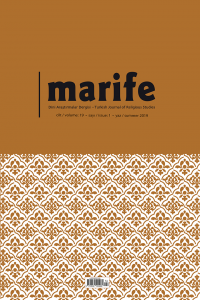
Marife Dini Araştırmalar Dergisi
Yazarlar: Mehdi CENGİZ
Konular:Din Bilimi
DOI:10.33420/marife.894205
Anahtar Kelimeler:Arabic Language and Rhetoric,Science,Linguistic,Wadʿ,Mullā Lutfī,Al-Maṭālib al-ʾilāhiyya
Özet: In modern times, the existence of original philosophy of the Ottomans in general and Islamic thought in particular, it has been questioned. Besides, original understanding of linguistics has also been one of the most questioned topics. This questioning requires the determination of classical linguistic studies in the Islamic thought tradition and putting forward the theories on which they are based. There are different studies focusing on different periods which defend the idea that Islamic thought has its understanding of language. But in these works, the phenomenon of wadʿ, which is the main theory on which linguistic studies are based, was not taken into account or studied at a theoretical level. Because existence of a original linguistic understanding is only possible by identifying the theories on which this understanding is based and examining them within the framework of linguistics. In this context, our study, which argues that Islamic Thought has its own original understanding of linguistics, aims to evaluate the relationship between modern linguistics and wad‘ theory. It is possible to see in Mullā Luṭfī’s vazʿ understanding, the principle of understanding language by avoiding rule-making, which distinguishes linguistics from grammatical studies. He tried to explain language phenomena following the scientific knowledge in the period. He also dealt with the wad‘ theory, which he based on the classification of linguistic sciences, not only in the Arabic language, but in all languages. Mullā Luṭfī, who stated that people have to communicate to continue their lives, and the most beautiful way to do this is sound, examines the language within the scientific paradigm of his day. Therefore, he uses biology and physics to describe the process of sound formation. In addition, Mullā Luṭfī, who explains the mental formes (sûret) that occur when the sound is heard with cognitive psychology, draws attention to the mutual relationship between the heart and brain and the pressure that it creates in the breathing channel. According to him, the uttorance follow three defined processings: pressure, breathing and finally sound, respectively. Mullā Luṭfī points out that the feature that distinguishes humans and other creatures from each other is reason and the ability to speak. As for the origin of languages, Mullā Luṭfī, who considers language as a conventional (isṭilâh), not a theological (tawqîf) phenomenon, suggests that language and writing were formed in different periods. He also expresses the fact that after specific stages, language becomes more natural. According to him, more clearly, words are rough at the beginning and they can only express a limited number of meanings at first, but then they start to settle and take a form that expresses more complex meanings. Mullā Luṭfī, while dividing the wad‘ of words into al-shakhsî and al-naw‘î, associates linguistic phenomena such as homophony with wadʿ. He explains the ʿilm al-bayān and ʿilm al-maʿānī, which are the sub-disciplines of ʿilm al-balāgha, based on wad‘ theory. For this reason, his work titled al-Matālib al-ilāhiyya fī mawdū‘āt al-ulūm al-lughawiyya, in which he classified sciences of linguistics was accepted by some scribes as a book of wad‘. This study, which argues that he has a unique understanding of linguistics, focuses on examining the relationship between wad‘ theory on which the classical linguistics issues is based and the modern linguistics according to Mullā Luṭfī (d. 900/1495). To do so, firstly, a conceptual framework is drawn about modern linguistics and wad‘ in terms of showing how language is studied scientifically, and then, in the example of Mullā Luṭfī, the relation of wad‘ theory with modern linguistics studies is revealed. At the same time, some common grounds where classical linguistics meets modern linguistics fields it is shown. Thus, the close relationship between the discipline of wadʿ and linguistics is evaluated.